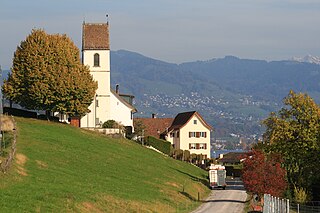Bollingen may refer to:

Bern, or Berne, is the de facto capital of Switzerland, referred to as the "federal city". With a population of about 133,000, Bern is the fifth-most populous city in Switzerland, behind Zürich, Geneva, Basel and Lausanne. The Bern agglomeration, which includes 36 municipalities, had a population of 406,900 in 2014. The metropolitan area had a population of 660,000 in 2000.
Wallis may refer to:

Wurmsbach Abbey is a monastery of Cistercian nuns located in Bollingen, a locality of Rapperswil-Jona, in the Canton of St. Gallen, Switzerland. It is located on the north shore of upper Lake Zürich. The house is a part of the Order of Cistercians of the Common Observance (O.Cist.).

Municipalities are the lowest level of administrative division in Switzerland. Each municipality is part of one of the Swiss cantons, which form the Swiss Confederation. In most cantons, municipalities are also part of districts or other sub-cantonal administrative divisions.
The Bollingen Prize for Poetry is a literary honor bestowed on an American poet. Every two years, the award recognizes a poet for best new volume of work or lifetime achievement. It is awarded without nominations or submissions by the Beinecke Rare Book and Manuscript Library of Yale University.
Arni may refer to:
Biel/Bienne is a city in the canton of Berne, Switzerland.
Schwanden may refer to places in Switzerland:

Beringen is a municipality in the canton of Schaffhausen in Switzerland. On 1 January 2013 the municipality of Guntmadingen merged into the municipality of Beringen.
Bollinger is an independent Champagne house from the Champagne region of France.
The Bollingen Foundation was an educational foundation set up along the lines of a university press in 1945. It was named after Bollingen Tower, Carl Jung's country home in Bollingen, Switzerland. Funding was provided by Paul Mellon and his wife Mary Conover Mellon. The Foundation became inactive in 1968, and its publications were later re-issued by Princeton University Press.

Jona is a former municipality and since January 2007 part of the municipality of Rapperswil-Jona in the Wahlkreis (constituency) of See-Gaster in the canton of St. Gallen in Switzerland. Before the merger with Rapperswil, the former municipality of Jona comprised the villages of Jona, Bollingen, Busskirch, Curtiberg, Kempraten-Lenggis, and Wagen.

Bollingen is a village (Kirchdorf) within the municipality of Rapperswil-Jona in the Swiss canton of St. Gallen.
Schwendi may refer to:

The Battle of Grauholz on 5 March 1798 was a battle between a Bernese army under Karl Ludwig von Erlach against the French Revolutionary Army under Balthazar Alexis Henri Schauenburg. The battle took place at Grauholz, a wooded hill in what is now the municipalities of Urtenen-Schönbühl and Moosseedorf in the canton of Bern in Switzerland. The government of Bern had already surrendered the previous day, and the Bernese defeat at Grauholz ended their resistance to the French in the north of the canton.
Schwändi, Schwaendi or Schwandi may refer to:

The Obersee is the smaller of the two parts of Zürichsee in the cantons of St. Gallen and Schwyz in Switzerland.

Buechberg is an elongated molasse hill in the Swiss cantons of Schwyz and St. Gallen on Obersee lakeshore.

Bollinger Sandstein or Bollingen Sandstone is a sandstone found on Obersee lake shore, namely between Bollingen and Uznach and Buechberg area, in the cantons of St. Gallen and Schwyz in Switzerland.
Bollinger is a habitational surname for someone from any of three places called Bollingen, in Schwyz, Württemberg, and Oldenburg. Notable people with the surname include: